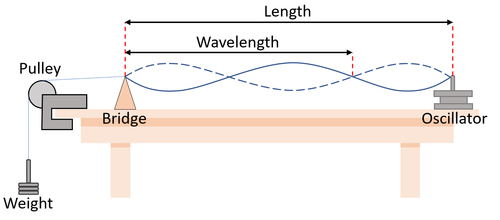Difference between revisions of "Waves on a String"
| Line 6: | Line 6: | ||
: A '''wave on a string''' is a [[Mechanical Wave|mechanical wave]]. | : A '''wave on a string''' is a [[Mechanical Wave|mechanical wave]]. | ||
: A '''wave on a string''' is [[transverse]] because the [[oscillation]] is [[perpendicular]] to the direction of travel of the [[wave]]. | : A '''wave on a string''' is [[transverse]] because the [[oscillation]] is [[perpendicular]] to the direction of travel of the [[wave]]. | ||
| + | : '''Waves on a string''', like all [[wave]]s, carry [[energy]] and [[information]] but they do not [[transfer]] [[mass]] from one location to another. | ||
{| class="wikitable" | {| class="wikitable" | ||
Revision as of 20:42, 18 February 2019
Key Stage 4
Meaning
A wave on a string is a transverse wave that passes along a length of string, wire or cable.
About Waves on a String
- A wave on a string is a mechanical wave.
- A wave on a string is transverse because the oscillation is perpendicular to the direction of travel of the wave.
- Waves on a string, like all waves, carry energy and information but they do not transfer mass from one location to another.
| Waves on a string can be observed using the equipment shown in the diagram. If the oscillator is set to a known frequency the wavelength can be measured with a ruler and this can be used to find the wave speed. |
